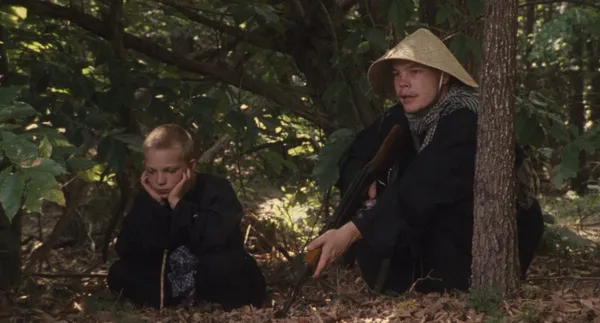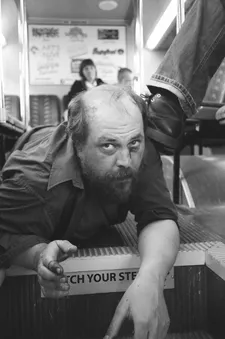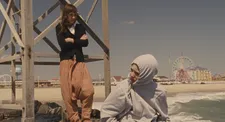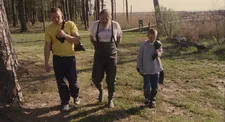 |
| "A lot of the films I love are very quiet films, that's the aesthetic of a film that moves me - the economy of it" |
Andrew T Betzer's debut feature Young Bodies Heal Quickly premiered at
Theirs is a world of mixed messages, unfocussed aggression and a lack of communication - they never call one another by name and are referred to simply as the Older (Gabriel Croft) and Younger (Hale Lytle) and the audience is left to deduce for themselves that they ultimately end up at the home of their father (Daniel P Jones). This is off-season and off-road America, with liaisons on the margins in a seaside town (involving Hadewijch star Julie Sokolowski) and a trip to a Vietnam re-enactment lending a bizarre edge to the naturalistic Americana.
I caught up with Betzer to ask him about the film.
What inspired you to tell this story?
Originally, I wanted to make a movie about a desolate beach town, in the winter time, off-season and I guess that was the first kernel of the story. Everything grew out from there. Anyone who has seen my short films... they usually end up being something about fathers and sons, brothers, male familial relationships - and this one followed suit in a kind of subconscious way.
There seems to be around 60 types of aggression in your film, even the acts of kindness are steeped in it?
That's a good summation of the wrap-up so to speak for Danny (Jones) and his older son - he doesn't know how to do anything that isn't tinged with aggression. That's just the environment they've been raised in. It beget itself from generation to generation but there are some hopes that the younger boy may rise above it. In addition to aggression it's an environment of mixed messages. There is no status quo in either of the parents' parenting styles which I think can definitely lead to an angry child.
 |
| "Honestly, using film, I end up way more involved in the process of being in there with the actors" |
When I write a script, it's a little more wordy, and as I go along I like to strip away when I find an opportunity to be able to sum up what's going on with an image or a succession of images rather than words. Also, when you're dealing with non-actors, it's very difficult to give them long passages of dialogue and have them memorise them and hit it like a professional would. So, it's a coping mechanism to a certain degree. And I do enjoy films where there is really just one or two things going on audio and visual wise on the screen at the same time. I don't like a very muddled scenario. A lot of the films I love are very quiet films, that's the aesthetic of a film that moves me - the economy of it.
The economy, particularly in the this film, suits the matter very well. You're suggesting that they've come from a home where communication is not at the forefront of family life. It's interesting that, in a way, it suggests how the older boy becomes an aggressive because he has no other way to communicate than through his aggression.
Most definitely. If I could get away with it, I'd have them just communicate in grunts and howls but I have to convey certain information through language. But it's most certainly a household of poor communication and of mixed messages. None of the kids in that family ever really know where they stand from one minute to the next. One minute they can be the father's pet and then he can be launching a full out attack on them for something they did or didn't do. That kind of intrigues me because I find that's a really weird way to grow up and it doesn't made for very well-heeled adults. I almost feel that a child would be better off if everything that comes at them from a parent is all good or all bad because then they know where they stand in the world. Otherwise it's very quaky ground.
I'm interested with the older kid, you show this physical loss of everything. He starts off, he's got his mother, the car, the kid, but as things go on he loses things, the air horn, the car, the cash and ultimately he begins to lose his accolyte. Was that deliberate.
To a certain point. I don't know that I'd ever thought of it that way. His character is by nature a very disorganised character and blows in like a tornado and screws up everything in his path. Naturally, I was thinking that that's one reason why he can never hold on to anything, especially when the vessels that they use to carry all their stuff around are trash bags - a very temporary kind of thing.
It was a Samuel Beckett image to me, he even begins to lose his own sense of self.
Having him leave things behind is kind of symbolic as he began to slide further and further down the path of no redemption. In a manner of speaking, the boy picks things up as he goes, he gains, whether it's his father's respect and affection or a small chance of redemption.
 |
| "I guess the women in the movie all work a little bit differently - a device to frame the older brother's wariness of the world to a degree." |
The boys are both big babies to begin with so I just saw it as not much of a stretch that they would be very close to their mother even though they were total screw-ups. The character that was their sister, to a certain degree, was maybe the one real character in the whole film who had broken the chain and escaped, and started over again. I guess the women in the movie all work a little bit differently - a device to frame the older brother's wariness of the world to a degree. Each one kind of represents something - his mother is the home, his sister represents a chance that maybe he could of had of having a home or a life, and the woman in a beach town is, for him, an unobtainable object - there's nothing about her that's real.
The film is quite bleak except for the small boy.
The actor I cast in that role brings that out in you a little bit. There's nothing bleak about him on a personal level and I think that really comes across in the film. He's very good at radiating hope, even when it wasn't in the story.
How hard was it to find him?
It is difficult, also you're auditioning their parents to a degree and how much they're going to put up with. It was tough to find him. You start with casting agents and then move out from there. I got lucky and saw a photo of him from a publicity still of a short film he was in and that made me reach out and get to know him and his family and everything just seemed to click from there.
You shot on Super 16mm, you work in the restoration of films as well as making films, does that play into a love of film itself.
I have a love for that particular medium that will probably never go away. I want to keep using it as long as it's around and as long as I can afford it. I like to be able to shoot 16 or film in general but if I ever get to the point where I have to go and make a film on my credit card then I'm just going to have to find something... I don't want to let the medium stand in the way of working.
But there's something about film in general. The photographic process, handling it, at the end of the day you get a stack of cans that you shot. There's really a sort of miraculous pass back - that your image is in that can it just hasn't been processed yet, there's something magical about it. With film, you have to have a little bit of faith with it, because if you really stop and dissect it in a pragmatic way, it seems crazy that people would spend millions of dollars to run out and expose these tiny little images on these tiny little frames and think that anything is going to come of it. If you had to explain that process to an alien, they would probably be dumbfounded by it. But here, we've been doing it for a hundred years and somehow it's always turned out all right.
Do you think using film encourages you to be more risk-taking?
 |
| "In a manner of speaking, the boy picks things up as he goes, he gains, whether it's his father's respect and affection or a small chance of redemption" |
How long did it take you to choose the music and select the music that's used at a refrain through the film?
It was very difficult. If you're just going to sum it all up in one song, there's so many things. There were two songs in the movie, one that were used several times over and one that stands alone in a different scene. I could tell you a million songs that I would want to use but I just decided to start searching and find something I'd never heard before that was a completely foreign song to me and I found that one.
I felt there was something really beautiful about the story of the song about this guy who goes home after however many years and realises that nothing is the same as it used to be and never will be again. It's a little bit how I feel when I go home to a certain degree.
I see in the press notes that you have dedicated the film to the memory of your son Ilan, is that part of it that there is a bit of you going into this film?
I started writing it before he was born and then I had to take a long hiatus during his life and I was not sure if I would ever pick up with it again and I did very quickly after he passed away. I don't want to say it was therapeutic but it was a good Band-Aid at the time. But it's sort of his movie because to a certain degree because right about the time I learned he was on his way I started on the screenplay and I started making it right after he passed away. So I felt it was apropo. It belongs to him to a certain degree.
Watch clips from the movie below:





















